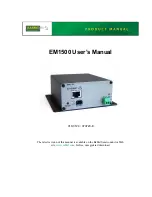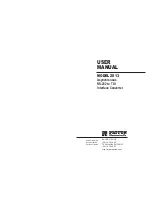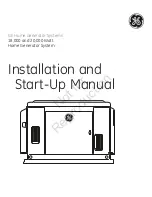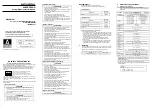
6 | SAMLEX AMERICA INC.
SAMLEX AMERICA INC. | 7
reactance X
L
to cause the current to lag the voltage by 90° and that of the capacitive
reactance X
C
to cause the current to lead the voltage by 90° are exactly opposite and
the net effect is a tendency to cancel each other. Hence, in a circuit containing both
inductances and capacitances, the net Reactance (X) will be equal to the difference
between the values of the inductive and capacitive reactances. The net Reactance (X)
will be inductive if X
L
> X
C
and capacitive if X
C
> X
L
.
Impedance, Z: It is the vectorial sum of Resistance and Reactance vectors in a circuit.
Active Power (P), Watts: It is denoted as “P” and the unit is “Watt”. It is the power that
is consumed in the resistive elements of the load. A load will require additional Reactive
Power for powering the inductive and capacitive elements. The effective power required
would be the Apparent Power that is a vectorial sum of the Active and Reactive Powers.
Reactive Power (Q), VAR: Is denoted as “Q” and the unit is VAR. Over a cycle, this power
is alternatively stored and returned by the inductive and capacitive elements of the load.
It is not consumed by the inductive and capacitive elements in the load but a certain
value travels from the AC source to these elements in the (+) half cycle of the sinusoidal
voltage (Positive value) and the same value is returned back to the AC source in the (-)
half cycle of the sinusoidal voltage (Negative value). Hence, when averaged over a span
of one cycle, the net value of this power is 0. However, on an instantaneous basis, this
power has to be provided by the AC source. Hence, the inverter, AC wiring and over cur-
rent protection devices have to be sized based on the combined effect of the Active and
Reactive Powers that is called the Apparent Power.
Apparent (S) Power, VA: This power, denoted by "S", is the vectorial sum of the Active
Power in Watts and the Reactive Power in “VAR”. In magnitude, it is equal to the RMS
value of voltage “V” X the RMS value of current “A”. The Unit is VA. Please note that
Apparent Power VA is more than the Active Power in Watts. Hence, the inverter, AC wir-
ing and over current protection devices have to be sized based on the Apparent Power.
Maximum Continuous Running AC Power Rating: This rating may be specified as “Active
Power” in Watts (W) or “Apparent Power” in Volt Amps (VA). It is normally specified in
“Active Power (P)” in Watts for Resistive type of loads that have Power Factor =1. Reac-
tive types of loads will draw higher value of “Apparent Power” that is the sum of “Ac-
tive and Reactive Powers”. Thus, AC power source should be sized based on the higher
“Apparent Power” Rating in (VA) for all Reactive Types of AC loads. If the AC power
source is sized based on the lower “Active Power” Rating in Watts (W), the AC power
source may be subjected to overload conditions when powering Reactive Type of loads.
Surge Power Rating: During start up, certain loads require considerably higher surge of power
for short duration (lasting from tens of millisecs to few seconds) as compared to their Maxi-
mum Continuous Running Power Rating. Some examples of such loads are given below:
• Electric Motors: At the moment when an electric motor is powered ON, the rotor
is stationary (equivalent to being “Locked”), there is no “Back EMF” and the
windings draw a very heavy surge of starting current (Amperes) called “Locked Rotor
SECTION 2 |
General Information
Содержание PST-1500-48
Страница 53: ...SAMLEX AMERICA INC 53 NOTES ...
Страница 54: ...54 SAMLEX AMERICA INC NOTES ...
Страница 55: ...SAMLEX AMERICA INC 55 NOTES ...








































